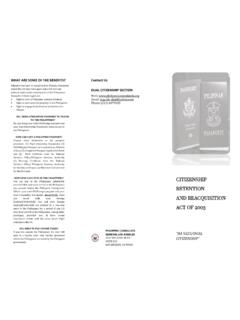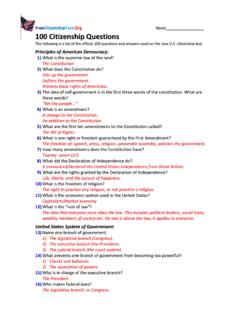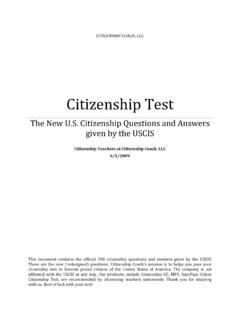Transcription of Citizenship Laws
1 United States Office of Personnel Management Investigations Service Citizenship laws of the World IS-1. March 2001. CONTENTS. INTRODUCTION AND GENERAL INFORMATION - Pages 3 through 8. Introduction - Page 3. Structure of Directory - Page 3. Reading a Country Entry - Page 4. General Information on Dual Citizenship - Page 6. United States Citizenship Information - Page 9. COUNTRY LISTINGS - Pages 11 through 219. Nations Of The World (listed alphabetically). SUPPLEMENTAL RESOURCE INFORMATION - Pages 221 through 228. DEPARTMENT OF STATE. CONSULAR SERVICES and DESK OFFICERS. TELEPHONE NUMBERS: African Region - Page 222. Central and South American Regions - Page 223. East Asian and Pacific Regions - Page 224. European and Canadian Regions - Page 225. Near Eastern and South Asian Regions - Page 226. Other Countries and Territories - Page 227.
2 LIBRARY OF CONGRESS. INTERNATIONAL LAW DIVISION. ADDRESSES AND TELEPHONE NUMBERS: Law Library, Reading Room - Page 228. Directorate of Legal Research - Page 228. Western Law Division - Page 228. Eastern Law Division - Page 228. INFORMATION AND DIRECTORY ASSISTANCE. TELEPHONE NUMBERS - Page 229. 2. Introduction and General Information INTRODUCTION. This directory provides synopses of the Citizenship laws for most of the world's countries. We obtained information for this directory from embassies, the Library of Congress, and the Department of State. The directory also provides the address, telephone number, and fax number of most countries' diplomatic representatives. We have made this document as accurate and up-to-date as our resources have allowed. The information contained in this directory should not be considered formal legal advice.
3 It is intended to serve as a quick reference document, summarizing the Citizenship laws of foreign nations and providing contact information. You should direct detailed or specific questions to a nation's specific diplomatic representatives. Readers should understand that Citizenship laws are often amended to keep in step with political changes. A considerable time lapse between the enactment of new laws and their actual implementation is not uncommon. Moreover, it is not unusual to encounter differences between a nation's laws and its actual practices. STRUCTURE OF DIRECTORY. This directory is an alphabetic listing of countries. The formal names of some countries are replaced by their more commonly known names. For example, the UNITED KINGDOM OF GREAT BRITAIN AND NORTHERN IRELAND is the formal name of England, Wales, Scotland, and Northern Ireland.
4 In this directory it is listed as UNITED KINGDOM. Most countries have changed their names at one time or another throughout history. For example, the country formerly known as Burma is now known as Myanmar, while the Ivory Coast is now Cote d'Ivoire. We have listed countries by their current names. In some instances, to avoid confusion, we have listed the most recent former names of nations next to their current names. 3. READING A COUNTRY ENTRY. STRUCTURE: Information in each country listing is presented as follows: Citizenship . DUAL Citizenship . LOSS OF Citizenship . ADDRESS. Citizenship : This section lists the various methods by which a person may obtain the Citizenship of a country. 1. Citizenship by Birth: Citizenship is granted due to birth within the country. The legal term for this is "jus solis.
5 " In most cases, there are few stipulations on Citizenship being granted. Birth in the country automatically confers Citizenship regardless of the parents' Citizenship or status. In the case of citizens born abroad in a country under the principle of jus solis, the question arises as to whether the other Citizenship continues after the child has left the country of birth. For definitive answers to questions such as this, contact the proper embassy or the Immigration and Naturalization Service. 2. Citizenship by Descent: Citizenship of a nation is passed on to a child based upon at least one of the parents being a citizen of that nation, regardless of the child's actual country of birth. The term for this is "jus sanguinis.". Though most countries adhere to the principle of Citizenship by descent, they differ on some factors (father's vs.)
6 Mother's rights, Citizenship of one or both parents, the marital status of the parents, and others). As a person reaches an age of maturity, continuing the condition of Citizenship by birth (jus solis) or Citizenship by descent (jus sanguinis) may depend on factors unique to the nation of that Citizenship . 3. Citizenship by Naturalization: This is a formal process by which persons may acquire the Citizenship of a country. The process varies and Citizenship is not guaranteed. Basic rules may include a period of residence, renunciation of other Citizenship , and familiarity with the language and customs of the country. 4. Citizenship by Marriage: By some nations' laws , upon marriage, a person is entitled to become a naturalized citizen of their spouse's country without having to fulfill other naturalization requirements.
7 These laws are often different for males than for females. 5. Citizenship by Registration: In some instances, A person may acquire Citizenship by registration with the national government without meeting all 4. naturalization requirements for that nation. Usually these persons possess blood ties to the country through immediate relatives who are citizens, or by marriage to a citizen of that country. DUAL Citizenship : Dual Citizenship is the simultaneous possession of two citizenships. It arises because there is no common international law relating to Citizenship . The most common reasons for dual Citizenship are these: Marriage to a citizen of another country. Adoption by parents who are citizens of another country. Birth in a country that grants Citizenship by birth, to parents who are citizens of a country that grants Citizenship by descent.
8 Not all nations recognize that their citizens may possess simultaneous Citizenship of another country. In this directory, dual Citizenship is addressed in the individual country listings as either RECOGNIZED or NOT RECOGNIZED by that country. The EXCEPTION entries list any exceptions to recognition or non-recognition of dual Citizenship . LOSS OF Citizenship : This category is divided into two parts, the voluntary and the involuntary loss of Citizenship . 1. Voluntary Loss of Citizenship : Most countries have laws which specify how a citizen may voluntarily renounce Citizenship . Precise information on renouncing Citizenship may be obtained from the country's embassy or consulate. In most cases, the person can do all the necessary paperwork through the embassy or consulate. Under the laws of some nations the person must return to the home country to complete the renunciation process.
9 Voluntary renunciation of Citizenship may be very difficult for citizens of some countries. The Department of State may be of assistance to citizens who wish to gather information concerning the voluntary renunciation of Citizenship of a particular country. 2. Involuntary Loss of Citizenship : This entry lists the reasons a particular country may choose to withdraw the Citizenship of one of its citizens. Most countries' laws dictate the loss of Citizenship upon a citizen's voluntary acquisition of another country's Citizenship . The interpretation of what constitutes "voluntary" is not uniform, however. In certain countries it is not considered voluntary unless the person makes an explicit declaration of the Citizenship of the other country. For example, in Austria a person automatically obtains Austrian Citizenship when appointed as a professor at an Austrian university.
10 Some countries interpret this as involuntary . Citizenship and, according to their laws , Citizenship is not lost. Other countries state that if a citizen obtains another nationality, and makes no effort to renounce it, Citizenship is lost. 5. Loss of naturalized Citizenship usually occurs when the naturalized citizen: Resided for a specified time in another country. Obtained Citizenship through fraud or false statements. Did not renounce previous Citizenship . Even if a nation's laws state that under certain circumstances Citizenship is automatically removed, until officials of the government or embassy are informed, the embassy will probably still retain that person's name in its Citizenship records. ADDRESS OF THE EMBASSY: This entry gives the address, phone number, and fax number of the representatives of the country in the United States.





